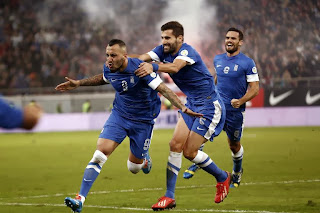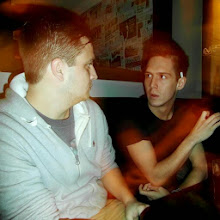Greek
football is on the resurgence and having recently qualified for the World Cup
in the play-off against Romania with a 4-2 aggregate score, the passion of the
World Cup is rippling back again in Athens. Currently in economic meltdown, the
years of 2004 and European Cup glory are very far behind the Greeks but they
still echo firmly in the minds of those who remember that final against
Portugal.
I’m an Englishman, first and foremost but even I still shed a tear
when I re-watch highlights of that final I shed a tear because I know that for
the Greeks, football is everything.
When Greece won it, I bawled like a baby.
It was
Churchill that said after World War Two, “Hence we will not say that Greeks
fight like heroes, but that heroes fight like Greeks”, and this is true during
any of their David and Goliath fights that the Greeks have found themselves up
against in the history books, be it football, basketball or any other
endeavour.
 |
| Mitroglou fires home against Romania. |
A small
nation, of roughly eleven million people, Greece has never really punched above
its weight in international fixtures when it has come to facing the giants of
Europe. Terrific derbies versus their old enemy Turkey have been the only
worthwhile fixtures in the Greek calendar. But that one sequence of events in
2004, with enough determination and belief ‘the Pirate Ship’ (as they were
affectionately known – a term used by Greek sports broadcasters) Otto Rehhagel under
the captainship of Theodoros Zagorakis, found themselves in an European Cup
final against Portugal. We English-Greeks had to listen to the likes of
Lawrenson et al and those dour, useless, for-some-reason-still-employed,
English broadcasters moan and belittle the Greek’s presence in the cup
throughout the Group Stage, Quarters and Semi finals. We had to listen to their
absolute bile through 90 minutes and then through every analysis.
I was
deeply offended at the time and felt that their words edged on xenophobia. Even
today I hear people criticise the formation and tactics of the Greek team that
summer, but really, how did everyone expect Greece to play against the likes of
Russian, Portugal (twice), Spain and France? These are the same commentators
that give Stoke or Sunderland credit when they dig deep and win one nil at
White Hart Lane? Yet these are the same heads that called Greece boring and
‘negative’. Greece are never going to be world beaters but that one year they
dug deep and congratulations for doing so. England have the fancy facilities,
the Oxygen chambers and their players have millions of pounds in the bank but
if the England team is lacking in one thing the Greeks will always have, it’s
passion. This is when I first began to see why my Scottish friends so
frequently get upset with the English media.
 |
| Karagounis expresses his disdain at not being awarded a penalty. |
Look at
Giorgios Karagounis a man who is the most famous Greek footballer, arguably, of
all time. The David Beckham of Greece as he is known, but at 36, his influence
as a player will be diminishing and the World Cup in Brazil will definitely be
his last competition as a Greek player and whether he chooses a career in
management, or coaching, will be his choice. I find him an ideal role model for
Greek football worldwide, his mentality in interviews and on the pitch is what
any fan wants from a footballer.
The
celebrations for the goals he scores, his eyes, the sheer dedication that
radiates from him. His sheers anger at getting booked for diving against Russia
in the group stage in the European Finals in 2004 really encapsulated his personality.
It was a Gascoigne moment for him. But Giorgios never cried, he roared and
screamed and the pain on his face was visible. This was a man who was unfairly
denied his chance in a Quarter Final, a pinnacle that he would never expect to
achieve in his life time and his passion was exact and not just for the
cameras. I am glad he has found at least a small input in a struggling Fulham
squad this season but it will be a shame to see him eventually go. His passion
still the same as it ever was. He stormed on the pitch to congratulate
Mitroglou on that first goal in the second leg versus Romania just last week,
despite being a sub and wearing a bib. This is something you would never expect
and England player to do. They’d just sit there, smile and refresh their
Twitter feed saying something ‘congratulations lads that was a good gole’
(sic.).
 |
| Nikos Dabizas squares up to Tottenham's Teddy Sheringham. |
Karagounis
is an interesting topic. He has had a few starts for Fulham this season,
scoring the odd goal in his tenure – but, unfortunately, Greek participation in
the major football leagues is thin on the ground. In the Premier League there
is Apostolos Vellios for Everton, who is not exactly what someone would call a
prolific striker; or Charolampos Mavrias, currently just joined at Sunderland,
still looking to make an impression. There is of course Dimitrios
Konstantopoulos who is reserve goalkeeper for Middlesbrough, but there is very
little point him even being mentioned, as his CV shows very little other than
being goalkeeper when AEK Athens were relegated for the first time in their long
history. One would look towards the history of England and see Newcastle’s
Nikos Dabizas (a moniker I actually used to write under) but still find their
countrymen underrepresented in a league that covers such a variety of nations.
Theo Zagorakis played briefly yet well for Leicester City while Angelos Basinas
felt himself frozen out at Portsmouth and Stellios Giannakopoulos did a fair
old stint at Bolton. I raise the question, was the idea of a ‘Greek’ too much
of a risk for a league that was increasingly turning to Spain, Italy, South
America for their talent pool? Maybe so.
Greece
have a wealth of young talent, including Sokratis Papastathopoulos who plays
for Borussia Dortmund, as well as Kryiakos Papadopoulos who plays for FC Shalke.
Striker Kostas Mitroglou, is top scorer for Olympiakos this season and top
scorer in the Greece Super League. With 14 goals already and brimming with
confidence he has been garnering interest from England including scouting
attempts from Liverpool, who have also shown an interest in Papadopoulos at
Shalke too. Mitroglou’s effort at international level has been nothing short of
incredible as without his goal scoring, Greece would be nowhere in the
competition. All these players are at 25 years of age and this could be a year
where Greece could expect to escape the group stage. As the days go by I am
reading more about interest from Mitroglou and his ability as a complete
footballer is astonishing. His strength, his touch and his ability to shield the
ball echoes a Greek Didier Drogba; although he will obviously expect never to
rise to the same heights. If, indeed Brendan Rogers does take the risk on
Kostas Mitroglou; and a risk it most certainly will be, I hope it pays off.
